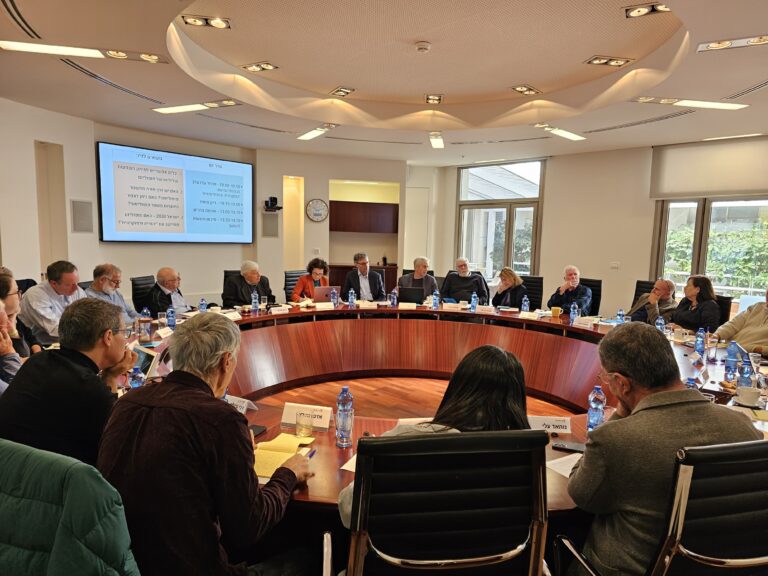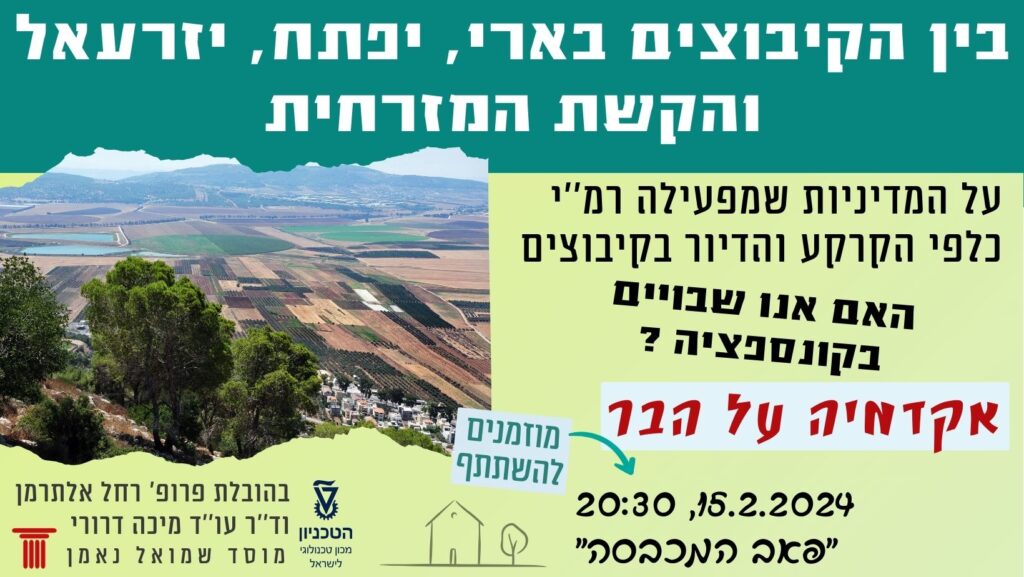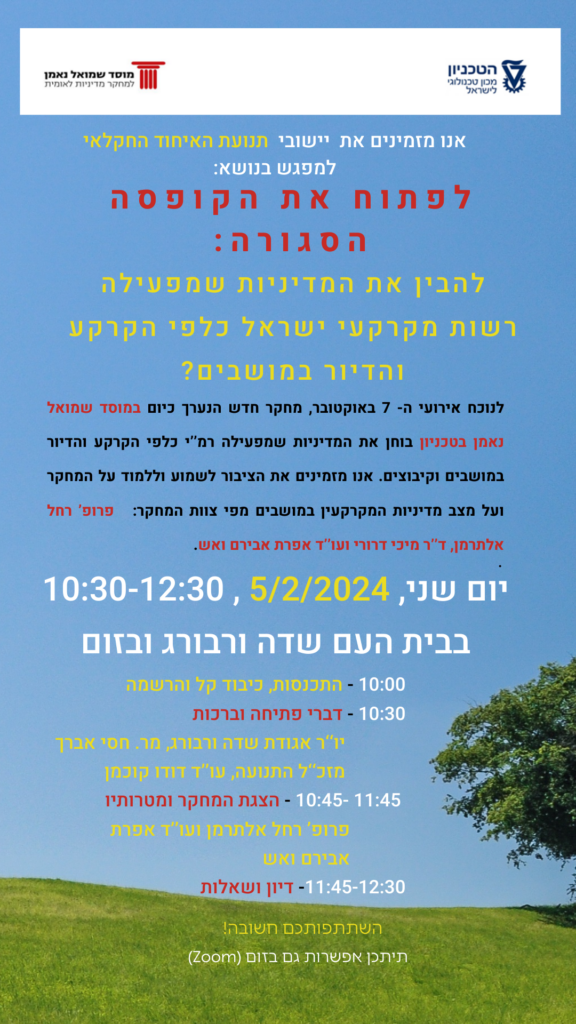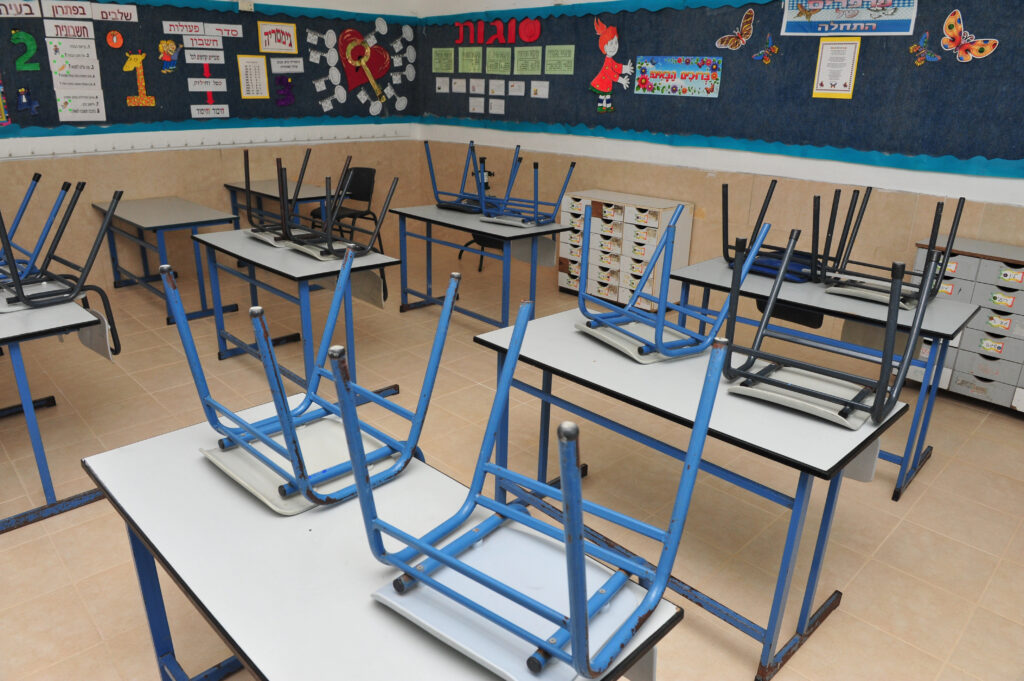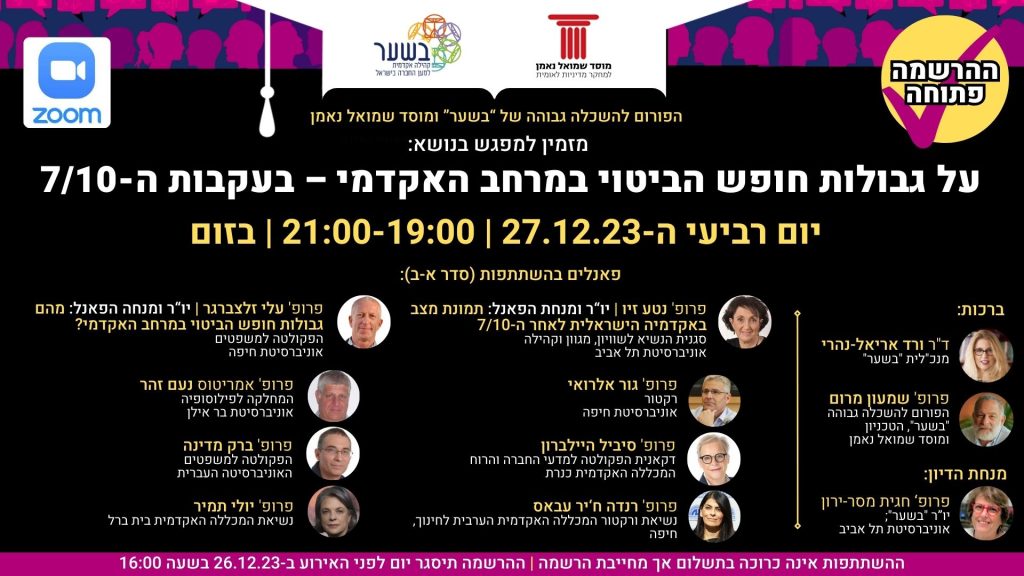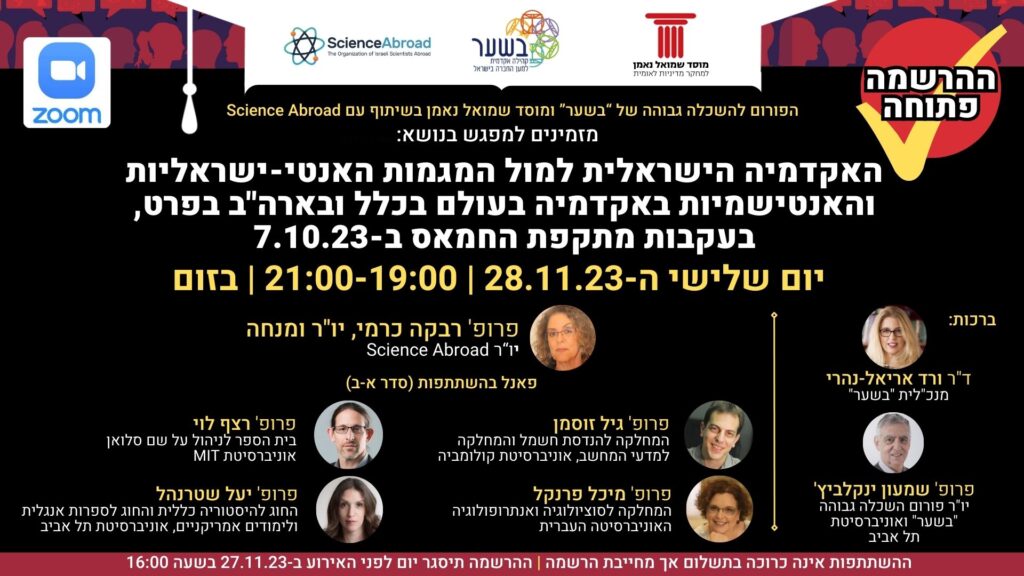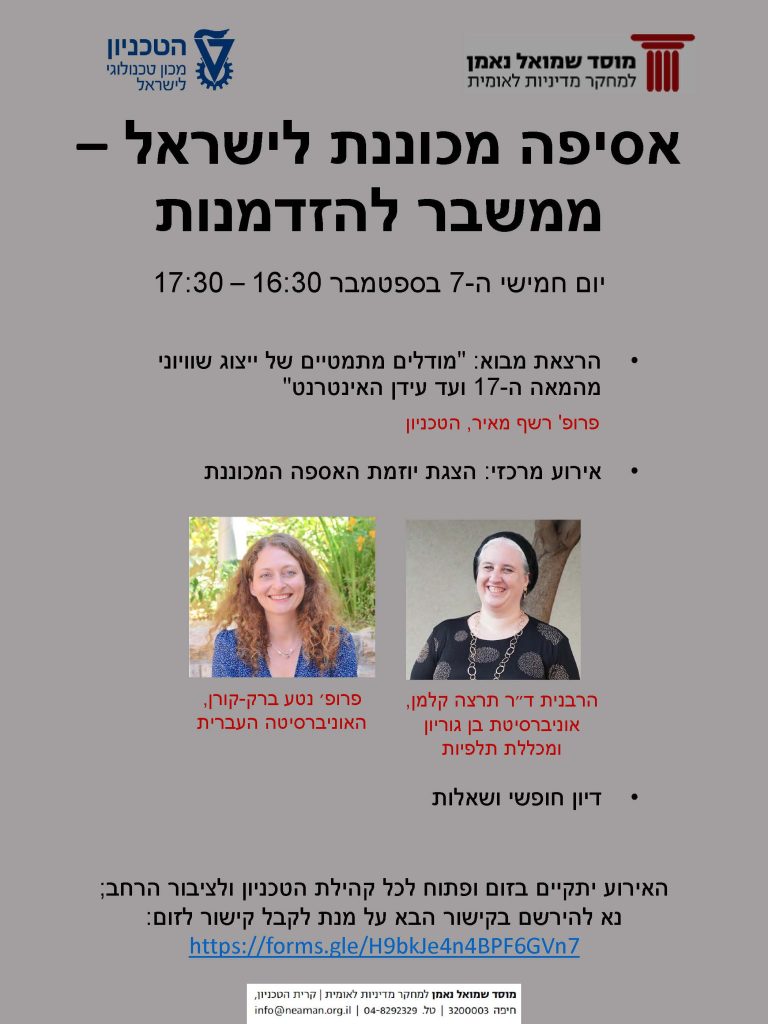פורום כלכלה וחברה – סיכום ‘שולחן עגול’ שהתקיים בנושא ב-29 בפברואר, 2024
הדיון שהתקיים במסגרת פורום כלכלה וחברה במוסד נאמן התמקד בדמוקרטיה בישראל כאבן ראשה של כל עיסוק בתחום הכלכלה והחברה. זה מספר שנים שהחברה הישראלית חווה חוסר יציבות ושסעים גדלים והולכים, שבאו לידי ביטוי בהיגררות לחמש מערכות בחירות במהלך שלוש וחצי שנים, בהידרדרות דמוקרטית ובמחאה ציבורית, בהיקף חסר תקדים, מתחילת 2023. יש הטוענים שמצב זה אף עודד את החמאס ליזום את טֶבח שמחת תורה ובכך להוביל למלחמה שעדיין נמשכת ועלולה להתעצם גם בזירה הצפונית.
בזירה הבינלאומית, מזה כ 20 שנה אנו עדים לכרסום של הדמוקרטיה הליברלית ובמספר גדל של מדינות, אנו צופים בתהליך של נטייה לכיוון של משטר פופוליסטי שבמקרים רבים מוביל לאוטוקרטיה אלקטורלית ואף לאוטוקרטיה מלאה. הניסיון בתחילת 2023, לחולל הפיכה משטרית, שכונתה על ידי יוזמיה רפורמה משפטית, עוררה כאמור, תנועת מחאה אזרחית רבת עוצמה. עם פרוץ מלחמת שמחת תורה ב 7.10.2023, קבלה המחלוקת ממדים ומשמעויות חסרי תקדים בהיסטוריה של מדינת ישראל. ההתגייסות המדהימה של משרתי המילואים למלחמה, החברה האזרחית שהמירה את המחאה בהירתמות מלאה למאמץ המדינתי האזרחי, כל זאת תוך הפגנת אחדות מלאה, מחד, לצד חששות לגבי עתידה של מדינת ישראל כמדינה יהודית ודמוקרטית ברוח מגילת העצמאות עם שוך הקרבות,
מאידך.במדד הדמוקרטיה של ה Economist לשנת 2023, מסווגת מדינת ישראל כדמוקרטיה פגומה, (https://www.eiu.com/n/campaigns/democracyindex-2023) המדורגת במקום 30 בעולם. במרכיב התפקוד הממשלתי קבלה ישראל 7.50 (מתוך 10). זאת בהשוואה לשבדיה ופינלנד (9.64), הולנד (8.93), גרמניה (8.17), וצרפת (7.86). מעניין במיוחד מרכיב הזכויות האזרחיות (Civil Liberties) בו ישראל קבלה 5.59 (מתוך 10), נמוך אף מפולין (7.35) הונגריה (6.76) והולנד (9.41).
על פי דו”ח הדמוקרטיה 2024 של מכון V-Dem שהוא מדד חשוב למדידת חוזק דמוקרטי, (https://www.v-dem.net/documents/44/v-dem_dr2024_highres_KxBjZAA.pdf), ישראל איבדה בשנת 2023 את מעמדה רב השנים כדמוקרטיה ליברלית. כיום היא מסווגת כדמוקרטיה אלקטורלית, בדומה לפולין ודרום אפריקה. המשך התהליך עלול להוביל לסיווג כאוטוקרטיה אלקטורלית כמו הונגריה ורוסיה.
נוכח חוסר הבהירות של התמונה הפוליטית החלטנו לקיים דיון שולחן עגול שעסוק באופייה הדמוקרטי של מדינת ישראל בשנת 2030 – מועד עתידי אמנם, אך הנמצא באופק הקרוב יחסית. שאלנו: האם הדמוקרטיה בישראל, בעשור הקרוב, תהיה ליברלית, או פופוליסטית בדרך לאוטוקרטיה?
הפופוליזם, שהוא גורם חשוב בתהליך זה, עמד במוקד הדיון. פופוליזם הוא מושג שנוי במחלוקת שמתערבב לעיתים קרובות עם מושגים כגון: לאומיות, אתניות, אוטוריטריות ולעתים גם אבחנה בין טוב ורע למדינה. הפופוליזם המתבטא בהתנגדות לאליטות, תוך טינה עמוקה ודה-לגיטימציה ליריבים פוליטיים ולמשרתי ציבור, לעתים עד כדי האשמתם בבגידה, ומוציא אותם מהקבוצה הלגיטימית שהיא “העם”, שרק הוא ראוי להחליט החלטות פוליטיות. פרקטיקה שלטונית זו, המובלת בדרך כלל על ידי מנהיג חזק, בדרך כלל בעל אפיוני אישיות נרקיסיסטיים, יוצרת קואליציות לא הגיוניות פוליטיות וכלכליות. קואליציות כאלה מקדמות את האחיזה של הפופוליסטים בשלטון להיעשות מאד חזקה.
על פי חלק מהחוקרים פגיעה בדמוקרטיה ליברלית היא חלק מהגדרת היסוד של פופוליזם. זאת עקב ביטול מעצורים ליישום הרצון הפוליטי של הרוב, כפי שמוצג על ידי המנהיג החזק, באמצעות החלשת שומרי הסף השונים, צמצום ההפרדה בין הרשויות ולמעשה הפרת מערכת האיזונים והבלמים המאפיינת את הדמוקרטיה הליברלית. המהלכים הפופוליסטיים יינקטו, בדרך כלל, בגבולות הלגיטימציה הדמוקרטית תוך “מתיחתם” עד לקצה, פעולה היוצרת קושי בהפיכתם – חזרה של מהלכים אלה בהמשך.
כדי לנסות ולברר נושאים אלה, החלטנו לקיים במוסד נאמן דיון מקצועי, במתכונת ‘שולחן עגול’, שכותרתו: ישראל ב 2030, דמוקרטיה ליברלית, דמוקרטיה פופוליסטית או אוטוקרטיה?
לצורך מיקוד הדיון הצבנו בפני המשתתפים את השאלות הבאות:
א. מהם הכלים האפשריים למיתון השפעות שליליות של פופוליזם? (כגון חוקה, שיטת בחירות, מבנה הממשלה, הפרדת הרשויות, שני בתי מחוקקים, חיזוק שומרי הסף, ביזור סמכויות לשלטון המקומי, וכיו”ב).
ב. האם יש דרכים למניעת היווצרות שלטון פופוליסטי? האם יש דרך חזרה ממשטר פופוליסטי לדמוקרטיה ליברלית?
ג. ישראל 2030: האם פופוליזם מתיישב עם “יהודית ודמוקרטית”?
הדיון התקיים במוסד נאמן ב 29 בפברואר 2024. נטלו בו חלק עשרים וארבעה משתתפים בעלי רקע, התמחויות ועיסוקים מגוונים (ראו טבלה מס’ 1). המשתתפים נשאו דברים קצרים והתבקשו להתייחס גם לדברי קודמיהם. עיקרי הדברים מופיעים בדו”ח זה תוך שמירה על ההתנסחויות כפי שבוטאו בדיון עצמו. אין ספק שהדברים שהועלו בדיון הינם אך נגיעה בקצה הקרחון, אך גם מצביעים על סוגיות נוספות שיש להעמיק בהן


